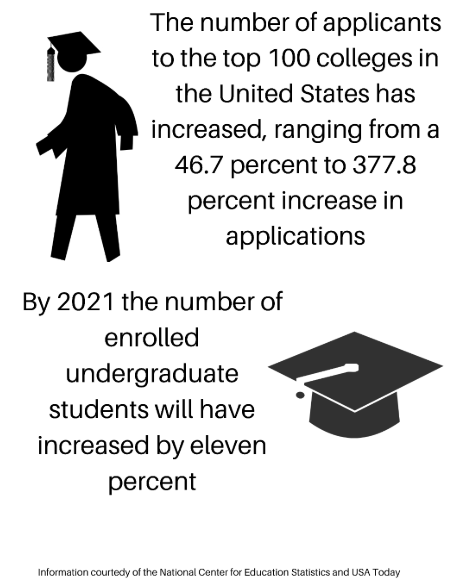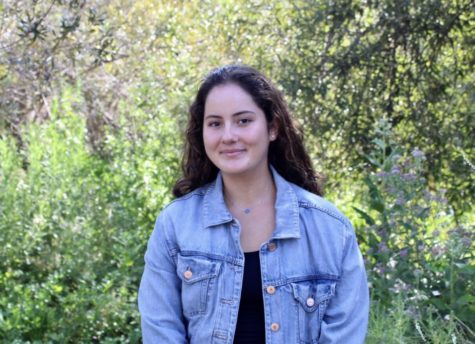Competitive college admissions

College admissions in the United States of America have become increasingly competitive throughout the past years.
April 2, 2019
When Anthony Ybarra, former Admissions Officer from the University of Southern California and current proprietor of Veritas Academic Consulting applied to his selection of colleges and universities in the 1990s, he had no idea that the college applications and admissions process would become so competitive for the students he works with.
So competitive, in fact, that he has made a job out of helping high school students to get into their preferred universities.
Mr. Ybarra is a private college consultant and works with the consulting company Veritas Academic Consulting.
“There’s record breaking amounts of students applying to colleges, and the number keeps growing.” Mr. Ybarra said. “The increased amount of people applying has also increased the level of competitiveness for getting into college.”
The competitiveness to which Mr. Ybarra referred to has been a growing issue for American students and students who wish to attend American universities, as the number of applicants to the top schools in the U.S. has continued to grow in recent years.
The admissions process has become so competitive that a mixture of celebrities, high status CEOs and wealthy individual have been paying off staff members in a variety of ways in order for their children to get into college. Among the most notable cases are actresses Mrs. Felicity Huffman and Mrs. Lori Loughlin.
Mrs. Loughlin and Mrs. Huffman both allegedly paid thousands of dollars in bribes to get their children into top colleges.
According to the National Center for Education Statistics, there are 19 million undergraduate students in the U.S., a spike in the number of students compared to the 13.2 million undergraduate students in 2000.
The NCES estimates that by 2021 the number of enrolled undergraduate students will have increased by eleven percent.
According to USA Today, the number of applicants to the top 100 colleges in the United States has also increased, ranging from a 46.7 percent to 377.8 percent increase.
Agreeing with Mr. Ybarra about the growing competitiveness of the application, CCHS college counselor Miss Colette Reid also notes the increasing importance of attending a four year university and getting a degree.
“This looks like it’s taking over your lives,” Miss Reid said. “It seems like all you talk about is college. You ask each other ‘What did you get on the SAT?’ or ‘What’s your GPA?’ When I was in high school we almost never talked about college apps.”
However, both Miss Reid and Mr. Ybarra both note that a high SAT or ACT score or high grade point average (GPA) are now less important for admissions.
“Colleges are now looking for more extracurricular involvement,” Miss Reid said. “They’re going to be paying more attention to sports, clubs, and community service.”
Students nowadays are so busy it seems no one has time to fit in all the qualities for doing well in college admissions, however, CCHS student Dominic Sprigg ‘19 has made sure to include almost every aspect into his repertoire.
“I am the president of NHS, the co-captain of the speech and debate team, the captain of the Academic League, and I do a lot of service with my church,” Sprigg said.
Students like Sprigg not only stand out for their extensive extracurriculars, but also for their high SAT scores and GPAs.
Despite having an extremely well-rounded application, Sprigg is not free of the anxiety and nervousness so many high school students experience when it comes to the application process.
“Of course I’m nervous,” Sprigg said. “But I do think I’m way less stressed than a lot of my friends are.”
Sprigg credits this relieved stress to the fact that he began his application process earlier than most.
“I started the application process in summer, and most of my friends started in the fall,” Sprigg said.
However, Sprigg also notes that the application process itself is not as stressful as one would expect, rather, it is the nervousness that arises from not knowing whether or not one has been accepted into a university of their choice.
Mr. Ybarra also notes other factors in increased competitiveness such as increased diversity, the use of the internet, and an increase in the overall population.
This competitiveness cannot be avoided, but, according to Mr. Ybarra, families should begin planning for colleges ideally at the end of middle school. The need for a college consultant has become more crucial, as, according to Mr. Ybarra, there is more at stake and less room for error.
It is also worth noting that the increase of price of higher education has also contributed to the competitiveness of college admissions.
“It is more competitive due to the fact that more people are applying, especially to the top colleges,” Mr. Ybarra said. “Since the cost of higher education has significantly increased, families only want to invest or have their children attend the best institutions, as they feel they will have a better return on their investments.
“The days of being well rounded are gone. There is an essential need to figure out how to best present the student upon application time.”





















































